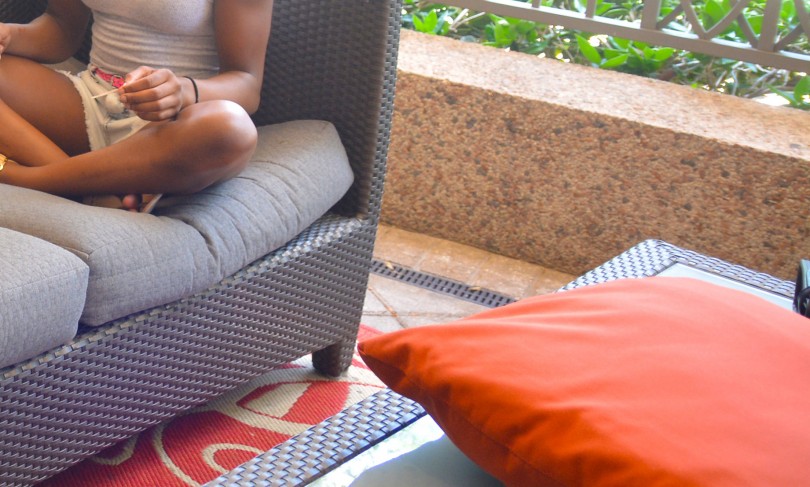By: Mpilo Ndlovu
Over the past year I have experienced what can best be described as a mounting desire to be fiercely unapologetic and frank about two things that define me; my blackness and my womanhood. This desire for audacity where my identity is concerned goes hand-in-hand with wanting to learn more about the state of womanhood and blackness so that I can better understand the many aspects of society’s hostility towards those two demographics.
There is nothing particularly ground-breaking about this awakening; wanting to be true to one’s self is something that many people experience. However, in the case of people who belong to marginalized groups, speaking out fearlessly is a vital tool in achieving visibility. Being candid is not just speaking boldly, it is a component of activism as well. How we define and navigate the psycho-emotional process of becoming more authentic differs depending on who and what we are. What matters is that we encourage ourselves and others to undergo this process as it enables us to initiate and participate in dialogue about key issues that affect us.
As unique as each process is, there are some constants that apply to many people. One of these constants is the reality that in certain environments, being authentic can mean inciting the disapproval of those occupying that particular environment. You have to relinquish the comfort found in being complacent and exchange it for the nerve to speak up for yourself and others.
I am a South African who was raised by parents who, although quite modern, still uphold a number of traditional Zulu beliefs and I have found that the discomfort of challenging orthodox views is further amplified if, like myself, you come from a background where due to the submissiveness expected from women (particularly young women), qualities like assertiveness are misconstrued as insolence.
The difficulty lies in that any act of self-improvement must begin in your immediate environment and it goes without saying that when your immediate environment is an African home, an act such as openly criticising systems like patriarchy is bound to ruffle many feathers.
Speaking up at home takes a fair amount of courage as it means challenging the behaviours and ideas held by people you love and respect. As challenging as it may be, mustering the courage to speak up against misogyny and gender disparities at home is likely to inspire you to speak up on those same issues in other spheres of human interaction.
In fact, I know that the confidence I gained as a child from being able to look at my parents and say, “Baba, Ma . . .that’s actually sexist” is the same confidence that has made me unafraid of speaking up about gender disparity in any space. Although it is not practical to believe that any one person can single-handedly reconstruct a space through speech, the transformative power of sustained dialogue is still a significant force.
Speaking openly can be daunting , especially in situations where offending somebody with contrasting views might mean losing acquaintances and/or friends. In such situations, it is important to remember that our friends and family members are just as capable as anyone else of holding views that support ideas and practices that oppress certain groups. Furthermore, if we are willing to critique those outside of our social circles for supporting oppressive ideals, then for consistency and integrity’s sake, we ought to hold those that form a part of our social circles up to a similar standard.
Statements and actions that are misogynistic, homophobic, ableist, transphobic or xenophobic in their nature still qualify as bigotry, even when coming from the people we socialize with. Furthermore, the fact that we care for our friends and family members ought to encourage us to engage them on the negative prejudices and beliefs that they may hold, rather than ignoring said prejudices.
In any setting where one has to speak honestly on matters of social justice with one’s friends, it is essential to remember two very, very important things. Firstly: any worthwhile friendship should allow individuals to critique each other with the aims of learning and growing, friends should not shy away from offering each other constructive criticism. Secondly: the survival of a true friendship should not rest on your willingness to protect the egos of your friends at the expense of honest dialogue about inequality, privilege and injustice.
For instance, my unwillingness to dilute my critique of the many manifestations of white supremacy (such as white privilege and white apathy) has resulted in the disintegration of some of my own friendships. It feels like a rite of passage; realising that some (quite a few in my case) of your white friends can only remain your friends on the premise that you assimilate into whiteness and dedicate yourself to ensuring that white folks are comfortable during all discussions (even if it means severely downplaying the realities of racial inequality).
White friends can view it as a great betrayal when you, the black friend, decide you care more about speaking candidly than you do about pandering to white approval and prefacing all of your statements with “not ALL white people”.
Another pattern that exists is that white friends are often unsettled –and in some cases, offended or even threatened- when you vocally defend, appreciate and support your race. Some go as far as to call you a racist (which is actually exhausting because surely by now we should all understand that black people lack the systemic power needed to qualify us as racists) or they pin the “angry-black-woman” narrative onto you in an effort to delegitimise everything you express.
At the end of the day, I can’t say I particularly care how many former friends, classmates and acquaintances lose the respect they once had for me. That isn’t the sort of “respect” I want from people anyway. I would very much prefer being respected for being unapologetic about who and what I am despite living in a world that finds black women’s authenticity offensive.
I don’t want the fickle respect that drives people to muzzle their truths for fear of losing it. I’ve been on the receiving end of that sort of respect before and I did not particularly enjoy the way it seemed to choke me with the countless strings attached to it.
One of the greatest things about pursuing a sincere sense of consciousness is that the pursuit sustains itself. Now, I mean the following in the least pretentious way possible: if you seek out knowledge with the intent of using it to articulate the sentiments of your people with sincerity, you soon discover that there is an infinite amount of learning (as well as unlearning) that you still have to do.
Strangely enough, the realisation that you know far less than you thought you did is not discouraging, instead, it acts as is a source of encouragement. Understanding that what you know is actually very little in the grand scheme of things, can really inspire you to learn even more.
Consequently, your desire to consume information and use it for activism is eventually fuelled by the knowledge that any information you do consume is only a tiny part of all there is to learn. This hunger for knowledge has the benefit of making a person quite receptive to new information and when a person is receptive to new information, they are also able to challenge what they already know. This ability to challenge what you consider to be the truth, translates into the ability to conquer social activism’s biggest challenge; identifying and amending your own prejudices.
I think it goes without saying that once you are able to problematize and criticize your own self with the aim of being more tolerant and intersectional, you then become an asset to your people as well as any social movement you align yourself with.
I don’t know everything there is to know about living authentically , but I definitely know that any attempt to exist unapologetically is an act of activism and a fight worth fighting.







are peas keto https://ketodietione.com/
gay dating sim for android https://gaychatgay.com/
gay tv shows 2021 dating https://gaydatingzz.com/
gay teen dating forum bdsm https://gaychatrooms.org/
online dating for gay men https://gaychatus.com/
gay virgin dating https://dating-gaym.com/
transgender gay dating https://datinggayservices.com/
gay dating knoxville tn https://gaydatinglosangeles.com/
masc discreet gay dating https://gay-singles-dating.com/
gay black dating websites https://gayedating.com/
online free gay dating https://gaydatingcanada.com/
analysis essay writing https://essaywritercentral.com/
write essay service https://essayghostwriter.com/
the write stuff thinking through essays https://essaysnet.com/
write about yourself essay https://essaytag.com/
essay writing books https://onlinecasinos4me.com/
write a college essay https://online2casino.com/
online casino with free signup bonus real money usa https://casinosonlinex.com/
kasino bonus https://onlinecasinoad.com/
kasino bonus https://casinoonlinek.com/
write a reflection essay https://buy1essay.com/
paid to write essays https://essaytodo.com/
the best essay writing service https://student-essay.com/
stripping sex games https://sexgameszone.com/
online sex games https://sexgamesx.net/
booze cruise sex games https://sex4games.com/
the family secrets sex games https://winsexgames.com/
sex games download https://sexygamess.com/